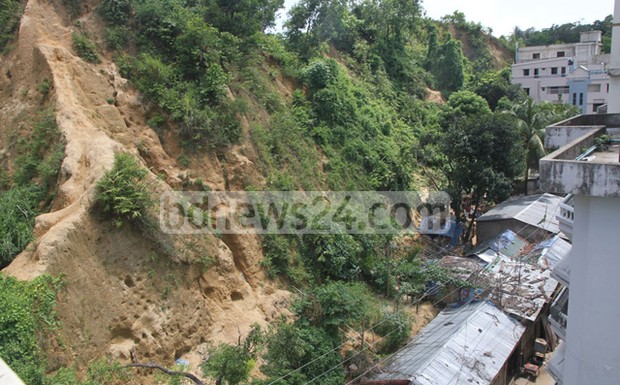It is literally a case of living on the edge.
From the last steps of Motijharna Tank Hill in Lalkhan Bazaar, Chittagong, one sees a maze of high-rise buildings and semi-pucca houses with corrugated tin roofs vying for space.
The entire hill slope is teeming with illegal dwellings. But preparations are on to level the slope further to build more houses, as part of hazardous and murky ventures that are only likely to surface when landslides cause loss of lives.
Following a heavy downpour, a landslide, occurred on June 11, 2007, killing two people in Motijhorna. Another one claimed seven lives at Kusumbagh, in Lalkhan.
On August 18, 2008, readymade garment worker Fatema, 35, and her daughter Kulsum, 17, were buried alive when the eastern side of Tank Hill collapsed on their house. Despite recurring landslides in that area, Fatima and Kulsum had refused to leave the place.
Fatima’s neighbour had a miraculous escape. Yet, she is still living in Tank Hill, knowing that the place is unsafe.
And, it now seems, she is going to have several neighbours.
Landslides have in no way been confined to Motijharna. They have occurred in the port city’s Akbar Shah, Tiger Pass, Batali Hill areas, too, killing many people.

Like Fatima, Bacchu Mia, 50, is still living on the slope of Batali Hill and haunted by the horrible memory of losing five relatives to a landslide on Jul 1, 2011, which altogether left 17 dead.
Bacchu Mia is now paralyzed and lives off his first wife, Rehana. Though he says he does not pay any rent for his dwelling in Batali Hill, his neighbour Mohiuddin has to pay a monthly rent of Tk 700. A local young man collects the money.
Witness to the 2011 landslide who recalls the tragic death of 127 people in a similar calamity in 2007, he chooses to live on there because the house rent is the lowest in this part of the city.
Most of Mohiuddin’s neighbours are day labourers and rickshaw-pullers who have come from various backward districts of Bangladesh.
Another landslide-prone area comprises the hills of Yasin Colony in Akbar Shah locality, where eight people had died in a landslide on June 26, 2012.
But the memory of the disaster has not deterred labourer Amirunnesa to stay on there with her three daughters in a single room for which she pays a monthly rent of Tk 1,300.

Amirunnesa, who came to the city 17 years ago, told bdnews24.com, “I know the danger of living here. But the rent is very low here. So I live here despite the risk of being buried alive.”
About the failure to halt the sprouting of illegal shanties, Chittagong Divisional Commissioner Md Abdullah said: “We oust one group and others fill the vacant places. Most of them belong to low-income groups. Influential quarters of the city let them live on precarious hill slopes at cheaper rents. We try to convince them.”
“We have been looking for ways to evict them. Owners of the hills have been told to take steps. Government and private officials have also been told to initiate steps at the meeting of the management committee,” added Abdullah.
After the 2007 disaster, an expert panel made 37 recommendations. But the divisional administration says it cannot implement them alone and expects all government bodies to join hands.
Hill Management Committee member secretary and Additional District Commissioner (Revenue) of Chittagong S M Abdur Quader said, “Thirty hills including previous 13 have been identified as risky for habitation. We will evict 666 especially vulnerable families living on these hills.”
A coordination committee has been formed to relocate the rest of the families in district administration operated rescue shelters during the rainy season.
Source: Bd news24










